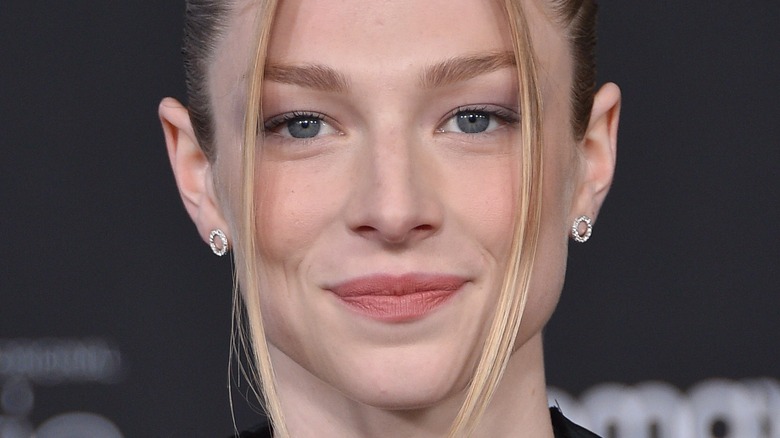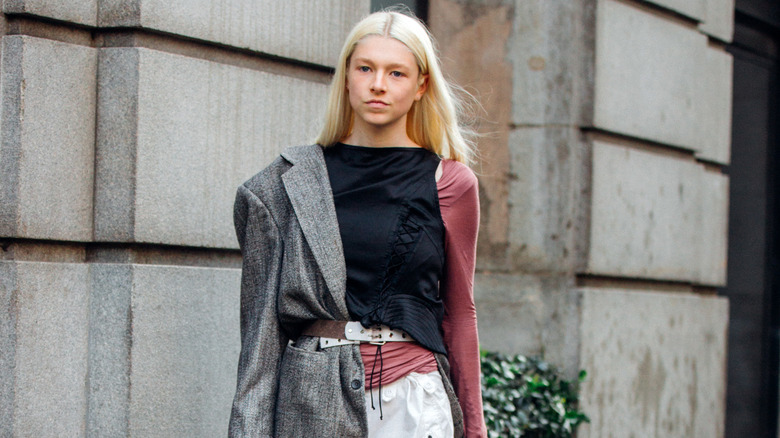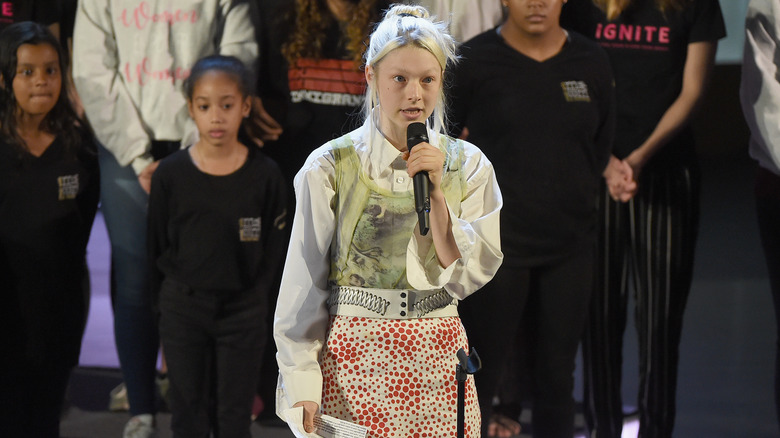What Hunter Schafer Was Doing Before Euphoria
When "Euphoria" released its first season in 2019, Hunter Schafer quickly became a fan favorite. Schafer plays Jules Vaughn, a transgender high school student grappling with her own secrets amidst some profoundly dark drama. As of late, real-life drama seems to be popular amongst the circle of "Euphoria" actors. Schafer's co-star Sydney Sweeney recently faced political backlash for sharing family photos that rubbed some fans the wrong way. And in August, Schafer separately took the heat for liking and commenting exclamation points on an Instagram post that addressed the role of the non-binary movement in anti-trans legislation regarding medical procedures. The controversial post sparked disagreement by calling attention to the different stakes faced by binary trans people and non-binary people.
Schafer later responded to criticism in the comments section of her own Instagram post (via Page Six), remarking on the nuances of the situation. She wrote, "I agreed with another t-girl's post in which she pointed out an in-balance in the visibility and space-taken up between non-binary folks and binary trans women (particularly those of color and/or those who have resulted to sex work as a means of survival) that i think deserves attention/ re-evaluation (as far as resources and platforms go) within the LGBTQ+ community."
This isn't the first time Schafer has defended her beliefs about trans rights. Long before she was known on "Euphoria," Schafer found meaningful ways to express herself and make a wider impact. Let's take a look at the actor's life pre-Jules.
Hunter Schafer modeled before Euphoria
"Euphoria" fans may be surprised to learn that Jules was Hunter Schafer's first acting role. However, the star wasn't completely out of the spotlight before her television debut. According to The New York Times, Schafer entered a contract with Elite Model Management in 2017. It didn't take long for the model, who was fresh out of high school and new to New York, to make her mark on the runway. Schafer was soon strutting down the catwalk for big designers like Helmut Lang and Versace. She told The New York Times, "Walking runway has been something I didn't even think would be a possibility in my lifetime with my circumstances and origins." Schafer, who began transitioning in high school, found power and purpose in the fashion world. She revealed, "What I'm trying to do in all senses is deconstruct our idea of gender, and use the privileges that come with looking like a model to bring attention to that."
In a 2019 Entertainment Weekly interview, Schafer described her path from the runway to network television. She said, "I was modeling for about a year in New York and had my sights set on fashion school afterwards and then as I was getting ready and gearing up for fashion school I saw this casting call floating around on Instagram. It was for trans girls, who didn't have to be experienced and it didn't say 'Euphoria' or anything but I was like, "Huh."' The rest is history.
Hunter Schafer was recognized for her activism efforts
Prior to joining the cast of "Euphoria," Hunter Schafer was known for more than her modeling career. At the age of 18, Schafer was featured in Teen Vogue's 2017 "21 Under 21" list for making waves as an activist. In 2016, she stepped up as a plaintiff in the American Civil Liberties Union's lawsuit against North Carolina's House Bill 2, per The New York Times. That same year, Schafer wrote an article for Teen Vogue called "How Transgender Teens Are Fighting Against Bathroom Laws." She wrote, "House Bill 2, which passed in March, forces transgender people like me and thousands of others into bathrooms that are contrary to our gender identity." She garnered a great deal of media attention by speaking up about the discriminatory nature of the law.
Despite gaining a following for trans rights advocacy, Schafer remained humble. She explained how activism can be a tricky term, telling The New York Times, "I don't know if I would call myself an activist, as much as someone who's just vocal about being trans, which sometimes can feel like activism, because just existing as a trans person can often be hard enough, particularly for people of color or people who don't pass."



